

Early Trends Among Seven Recommendations From the Choosing Wisely Campaign. Controlling Waste: What's in it for Us? Choosing (Medicine) Wisely: Good Answers for Good Questions The big medical news of the past week was about common sense restraint, rather than scientific advance.
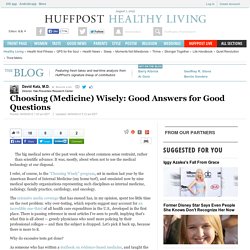
It was, mostly, about when not to use the medical technology at our disposal. I refer, of course, to the "Choosing Wisely" program, set in motion last year by the American Board of Internal Medicine (my home turf), and emulated now by nine medical specialty organizations representing such disciplines as internal medicine, radiology, family practice, cardiology, and oncology. The extensive media coverage that has ensued has, in my opinion, spent too little time on the root problem: why over-testing, which reports suggest may account for an incredible one-third of all health care expenditure in the U.S., developed in the first place. There is passing reference in most articles I've seen to profit, implying that's what this is all about -- greedy physicians who need more policing by their professional colleges -- and then the subject is dropped. Why do excessive tests get done? -fin Dr. 1) Patients’ experiences of treatment burden: so much more than a series of physical side effects!
Living with a long term condition is hard work.
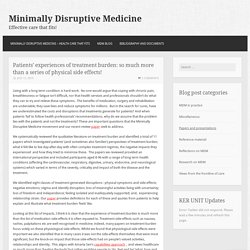
No-one would argue that coping with chronic pain, breathlessness or fatigue isn’t difficult, nor that health services and professionals shouldn’t do what they can to try and relieve these symptoms. The benefits of medication, surgery and rehabilitation are undeniable; they save lives and reduce symptoms for millions. But in the search for cures, have we underestimated the costs and disruptions that treatments generate for patients? And when patients ‘fail’ to follow health professionals’ recommendations, why do we assume that the problem lies with the patients and not the treatments? These are important questions that the Minimally Disruptive Medicine movement and our recent review paper seek to address.
Looking at this list of impacts, I think it is clear that the experience of treatment burden is much more than the list of medication side-effects it is often equated to. Like this: Like Loading... "Choosing Wisely Canada" and antimicrobial stewardship: A shared focus on reducing unnecessary care. To share this page just click on the social network icon of your choice.
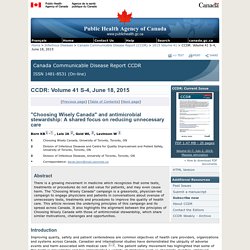
Canada Communicable Disease Report CCDR ISSN 1481-8531 (On-line) [Previous page] [Table of Contents] [Next page] Born KB , , Leis JA , Gold WL , Levinson W Abstract There is a growing movement in medicine which recognizes that some tests, treatments or procedures do not add value for patients, and may even cause harm. At the Welsh NHS confederation conference in January 2015, the Minister for Health and Social Services endorsed the prudent healthcare principles proposed by the independent Bevan Commission, following a year of vigorous discussion and debate.
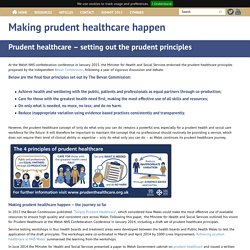
Below are the final four principles set out by The Bevan Commission: Achieve health and wellbeing with the public, patients and professionals as equal partners through co-production;Care for those with the greatest health need first, making the most effective use of all skills and resources;Do only what is needed, no more, no less; and do no harm.Reduce inappropriate variation using evidence based practices consistently and transparently. However, the prudent healthcare concept of ‘only do what only you can do’ remains a powerful one, especially for a prudent health and social care workforce for the future.
Making prudent healthcare happen – the journey so far. Choosing Wisely and Encouraging Effective Treatment. Choosing Wisely in the UK: the Academy of Medical Royal Colleges’ initiative to reduce the harms of too much medicine. A Malhotra, consultant clinical associate1, D Maughan, Royal College of Psychiatrists sustainability fellow 2, J Ansell, advanced trainee in general surgery3, R Lehman, senior research fellow4, A Henderson, chief executive 1, M Gray, director5, T Stephenson, former chair16, S Bailey, chair 1Author affiliationsCorrespondence to: A Malhotra Aseem_malhotra@hotmail.comAccepted 25 March 2015 A Malhotra and colleagues explain how and why a US initiative to get doctors to stop using interventions with no benefit is being brought to the UK The idea that some medical procedures are unnecessary and can do more harm than good is as old as medicine itself.
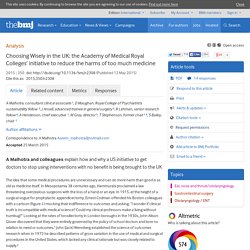
In Mesopotamia 38 centuries ago, Hammurabi proclaimed a law threatening overzealous surgeons with the loss of a hand or an eye. “Back Bay golden goose ostrich” cartoon Choosing Wisely in the NHS Tackling the underlying causes of overtreatment Doctors’ health illiteracy is well documented. Potential limitations Call to action and next steps Notes. CMAJ Test Your Knowledge Results: Choosing Wisely Canada.